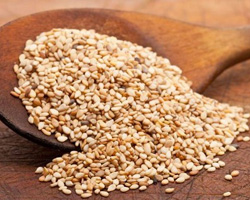
Sesame entered human nutrition and traditional medicine almost 6000 years ago and since then it has been used both to obtain quality oil and in combination with other products (dough, meat, vegetables) to prepare healthy and tasty meals. Sesame is native to Asia and has long been believed to have special anti-aging properties. It belongs to the group of legumes and is rich in vitamins A, E, B1 and B6, and it contains calcium, copper, iron, zinc and selenium. Among other compounds important for the functioning of the organism, it contains plant fibers, niacin, folic acid, riboflavin, phytosterols and lignans. The richness of these compounds puts sesame among the healthiest seeds, the consumption of which contributes to the reduction of bad cholesterol in the blood, prevention of cancer, diabetes, and high blood pressure. Sesame can also differ in color, so there are yellow, brown and dark sesame. From this seed, a high quality oil rich in unsaturated acids is obtained, which is used in human nutrition, but also in the production of various medical preparations.
